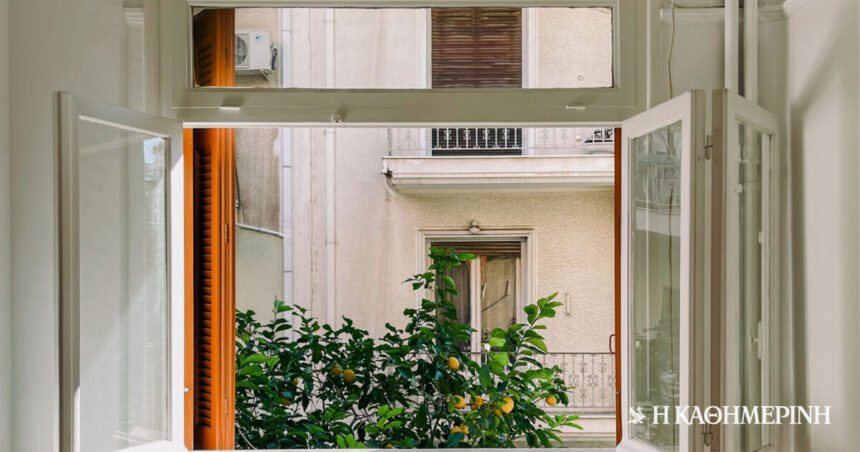In his much talked about series Vasilis Kekatou “Milky Way» (Mega), the seventeen-year-old protagonists dream of escaping from their provincial “slum” and finally living in Athena. The perpetual repetition of this collective adolescent dream (the utopia of the metropolis that will give space and wings to desires and youthful dreams) is enough to condense the apparent contradiction: the demand for housing is soaring and at the very same time the supply is hopelessly limited, often low architectural profile and revealingly expensive. We know the result of the equation, we see it, we live it. The Athenian dream accommodates fewer and fewer people.
Now the average asking price in the basin reaches 9 euros/sq.m. (8.95 euros/sq.m.), a price that before the financial crisis could only be found in Kolonaki and to Lycabettus. A significant number apartments has been withdrawn from the market due to the short term lease. The rise, now, is diffused and more uniform throughout the urban complex, i.e. both in “good” and less “good” neighborhoods. According to the latest “price list” published a few days ago by RE/MAX Greecethe average rental price in New world overcome the… Ekali (9.30 against 9 euros per sq.m.). This is the main difference: before the crisis, only the “horses” of the market were running (Kolonaki, Psychic, North and southern suburbs), but there was a choice of smaller and medium-sized neighborhoods to which a large portion of lower incomes had access. The Pagratithe Cuckoothe Expirationthe CellThe New world are some characteristic examples. After the pandemic and its recovery Airbnb, that changed drastically. In the centre of the city, studios and poorly maintained apartments with a view of the open or nowhere (underground) “jumped” from 200-250 euros, approximately, to price levels above 400 euros or even higher (Pagrati, Koukaki).
From Petralona, Peristeri
So, as the dust from the initial shock begins to settle, and any prospect of de-escalation is deemed unrealistic, the center’s most loyal “customers” (under-40s, young professionals, single-person households, etc.) are looking for alternatives . Both the most popular seem to be exploring less central and less popular districts (Column, Plato Academy, Acharnon, Kato Patisia etc.) but also reconsidering co-housing as an unfairly undervalued option for people who may have put their college years well behind them but don’t want to lose touch with the more central neighbourhoods.
In the first category belongs the 38-year-old journalist Lazaros Antoniadis, originally from Thessaloniki. He came to Athens in 2019, months before the outbreak of the coronavirus. His budget was limited and he turned from the beginning to areas that his wallet could afford. “Through an acquaintance I found a ground floor studio apartment of 35 sq.m. in a two-story house, very close to the hill of Ippio Colonos, for 170 euros. The neighborhood was very nice and I was an eight minute walk from the metro to Larissa Station. But at some point the house started to have problems and the owner had made it clear to me that he was not going to invest, as he intended to sell it. I decided to leave.”
He initially tried his luck in the fashionable neighborhoods but quickly realized that things had gotten out of hand. “As I had become relatively stable professionally, I was ready to move up the price level and move closer to more central areas, but what I saw in Pagrati, Neo Kosmos and even the farthest Peristeri was more than 450 euros for very average class apartments of 40-45 sq.m. I mean, even if I had a budget of 500 euros, I wouldn’t have given it, it seemed crazy to me.” After a search that lasted more than three months, Lazaros Antoniadis rented a small but renovated apartment of 28 sq.m. on 3rd September Street, not far from Victoria Square, for 350 euros a month.” In these 100 days of exhausting search, he thought of giving up and returning to Thessaloniki, he admits. “Obviously it crosses your mind, but for me returning to my homeland was tantamount to suicide, to giving up any version of personal life and progress. I’d rather boil spaghetti every day than go back to my childhood room at the age of 38.”
34-year-old Simos Sarafis followed the reverse course: from “in” Petralona, back to Peristeri, where he grew up. “I started at 250 euros for a raised ground floor of 55 square meters in 2017, followed by a move two streets down to a first floor apartment in 2020 for 300 euros, but at the end of the contract an increase to 450 was requested and somewhere there I realized that the center of Athens was finished for me”.
“The real problem is wages, not rents. The vast majority of people in their thirties are struggling with salaries close to 1,000 euros, how to respond to rents of 450 or 500 euros?”
For 29-year-old Elpida S., saying goodbye to her beloved Pagrati due to a sharp increase in rent was not an easy task. He paid 370 euros for 22 square meters, in a semi-basement near Proskopi Square. “The house was renovated and overlooked a nice courtyard, in the open. I was in everything, the metro nearby, my friends nearby, I had no complaints”. Just before Easter, the owner asked for an increase to 500 euros, including utilities and electricity and water bills. “I couldn’t stomach that I would give more than two-thirds of my salary for a nice 22 square meter basement because the prices in Pagrati have skyrocketed. Fortunately, through an acquaintance, I found a much larger apartment of 60 square meters in Petralona relatively soon for 370 euros.” The “through acquaintance” method is the last resort for many renters who feel they have to survive in a market that does not obey any logic. “Fortunately there is still a percentage of owners who accept to make concessions on the financial side if they appreciate who you are and your degree of reliability,” says Elpida.
Simos, however, believes that rents in Greece seem so expensive to us because wages are desperately low. “The real problem is wages, not rents. The vast majority of people in their thirties struggle with salaries well below or close to 1,000 euros, so how can they respond to rents of 450 or 500 euros?”
If Lazaros, Simos and Elpida did not think of cohabitation as a last resort, this does not mean at all that this way of reducing housing costs is not gradually entering the radar of many of their peers, and not only that. The 44-year-old interior architect Dimitris Papatheodorou rents a comfortable 130 sq.m. penthouse with two of his friends. in the privileged area of Makrygiannis, two minutes’ walk from the pedestrian street of Dionysiou Areopagitou. “There was no way I could have found such a nice house on my own,” he says. But Dimitris is almost a professional roommate. “Maybe it’s “to blame” that I grew up in a large family and I like to have people at home, the idea of returning to an empty house makes me sad.” And there is an additional parameter: “Large apartments are difficult to get for short-term rental, as a result of which their prices are more moderate compared to smaller ones which, due to Airbnb and higher demand, show the biggest increases. Therefore, even with a single roommate, you can achieve houses that you would simply miss out on alone Instagram».
Dominicos Pritis, its founder MyRoomie.gr, the first roommate-finding platform in Greece, with plans to expand to Europe as well (the first step has already been taken by Poland), assures me that cohabitation is starting to gain ground in Greece as well, surpassing its traditional targeting of students. “What we observe on the platform is a growing tendency of Greek professionals, especially young people, to choose cohabitation as a solution for better quality living in central areas.” Really, how revealing is the comparison with Poland? “It definitely is. Experience has shown us that cohabitation there is much more established and accepted as a form of living. The differences are evident both in the acceptance rate of cohabitation and in the availability of suitable spaces. In Poland, the corresponding real estate agencies have already adapted to this trend, offering housing solutions that include finding roommates.”
Another taboo
Indicative of the increased interest in cohabitation in our country as well is the appearance of corresponding “tools”, such as the platform Flatcake which was founded last year by three fellow students from NTU, Clearchos Vlahakos, Michalis Vassiliadis and George Theodoropoulos. “The generation of millennials in Greece he had not been trained at all in the idea of cohabitation”, notes Klearchos Vlahakos, and adds that “we notice, however, that more and more students and young professionals embrace our idea and it helps us to invest in an even better product”.
However, Ismeni S., 39 years old, with many years of cohabitation experience behind her, has her own interpretation of the reluctance of Greeks to cohabit. “Being 35 and 40 and looking for a roommate is still for a significant part of our society an indirect confession of … failure: either that you don’t have enough money to financially support your own home, or that you haven’t succeeded in your personal and you are looking for a… substitute for companionship. Or both!”
Dimitris believes that it is only a matter of time (and generation) for cohabitation to start entering the Greek DNA. “I think it all has to do with the standards of heteronormativity, of what it means to be a family and a couple today; these are all changing at such a speed that they will drag the way we choose to live out of molds of past times and different social realities.”




